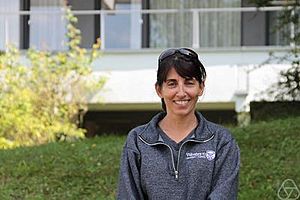Toniann Pitassi facts for kids
Quick facts for kids
Toniann Pitassi
|
|
|---|---|

Pitassi at the MFO workshop Proof Complexity and Beyond, 2017
|
|
| Nationality |
|
| Education | |
| Spouse(s) | Richard Zemel |
| Scientific career | |
| Fields | Mathematics, computer science |
| Institutions |
|
| Doctoral advisor | Stephen Cook |
Toniann Pitassi is a Canadian-American mathematician and computer scientist. She is an expert in a field called computational complexity theory. This field studies how difficult problems are for computers to solve. She is currently a special professor of engineering at Columbia University. Before that, she held an important research position at the University of Toronto.
Her Journey in Science
Toniann Pitassi grew up in Pittsburgh. She earned her first university degrees at Pennsylvania State University. Later, she moved to the University of Toronto for her advanced studies. She completed her PhD in 1992. Her supervisor was a famous computer scientist named Stephen Cook.
After her PhD, she did more research at the University of California, San Diego. She also taught at the University of Pittsburgh and the University of Arizona. In 2001, she returned to the University of Toronto. She was a professor there until 2021. Then, she joined the faculty at Columbia University.
She was invited to speak at a big meeting for mathematicians in Berlin in 1998. She also helped organize a major computer science conference in 2012. From September to December 2017, she was a visiting professor at the Institute for Advanced Study. This is a place where top scientists do research.
What She Studies
Pitassi's main research area is proof complexity. This is a part of computational complexity theory. It looks at how long and complicated mathematical proofs can be. A proof is a step-by-step argument that shows something is true.
The goal of this study is to understand two main things. First, how much time a computer needs to find a proof. Second, how strong different ways of proving things are. Her work helps us understand the limits of what computers can do.
She has made many important discoveries in this field. For example, she found ways to show that some proofs need to be very long. This applies to certain types of proofs, like those for the pigeonhole principle. The pigeonhole principle is a simple idea: if you have more pigeons than pigeonholes, at least one pigeonhole must have more than one pigeon.
She also studied how hard it is to solve problems like the maximum clique problem. This problem involves finding the largest group of connected points in a network. Her research helps us see why some problems are so difficult for computers.
Awards and Recognition
Toniann Pitassi has received several important honors for her work.
In 2018, she was chosen as an ACM Fellow. This award recognizes her important contributions to computer science research and education.
She also received the EATCS Award in 2021. This award is from the European Association for Theoretical Computer Science. It recognized her "fundamental and wide-ranging contributions to computational complexity."
In 2022, she was named to the National Academy of Sciences. This is a very high honor for scientists in the United States.
 | Leon Lynch |
 | Milton P. Webster |
 | Ferdinand Smith |

